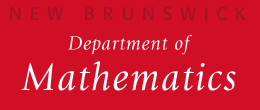General Course Information for Math 151-152
Required Materials: Textbook and WebAssign
We use the third edition of the textbook, bundled with WebAssign. Students should pay special attention to the following.
- The 3rd edition is purchased with a WebAssign access code which will be used throughout the sequence 151-152-251. The publisher is unable to replace this code if it is lost, so be careful to retain it. This code will be useful until you complete your required sequence of calculus courses, as long as the 3rd edition remains in use. Further information will be found on the individual course pages for each semester.
Required Materials: CALCULATOR
A graphing calculator is required for this course. We recommend the TI-83 or 83+, but any calculator with equivalent capacities can be used, such as the popular TI-85 or TI-86. Warning: Calculators can not be used on exams.
The calculators that are most familiar to the instructional staff are the TI-83 and 83+. We certainly won't use all the power of these instruments, but will concentrate on straightforward applications such as those described in these nice tutorials. Students should be aware that the numerical and graphical output of devices like graphing calculators may be deceptive. You shouldn't read more into the output than is there. Problems can happen if you don't heed this warning!
Class Meetings
For all students, lectures are given twice a week (80 min.), and workshops once a week (80 min).
In 5-credit versions of Math 151 or 152 there is a practicum of 55 minutes as well.
Large Lecture Format
Most sections meet in the large lecture format, in which lectures are conducted for three sections together, and the workshops are conducted separately for each section.
Single Section Format
Certain sections meet in the single section format. These sections also have 2 lectures and one workshop.
5 Credit Format
The 5 credit format includes an additional practicum of 55 minutes and may be given either in large lecture or small lecture format. The practicum provides an opportunity to discuss homework exercises from the text in detail.
As of Fall 2009, the 5-credit version is being offered in a large section format as Math 153, restricted to entering Engineering students selected by the Department of Engineering.
Workshops
In the workshop, you will work together with two or three other students. The emphasis will be on problem-solving strategies, multi-step problems, and good write-ups of your solutions. This small-group work will be directed by your professor if you are in one of the small classes, or by a teaching assistant if you are in one of the large lectures. Your TA is an experienced graduate student studying for a doctorate in some area of mathematical science. You will also be assisted by an undergraduate peer mentor. The peer mentors major in various fields at Rutgers, and you may eventually take on this role yourself.
Regardless of the course format, you will be required to work the weekly WebAssign homework problems, and to hand in at least one workshop problem per week, as announced by your instructor. Late workshop writeups will not be accepted.
More information and advice about workshops is found in the first pages of your textbook, in the Rutgers customized edition.
Exams and Grades
Two midterm exams called hour examinations will be given at times to be announced by your lecturer; they will occur approximately in the time slots for lectures #10 and #22. You will not be allowed the use of any formula sheets during exams. You will not be allowed the use of a calculator during exams.
The final examination will be given in the Math Group Final time and ordinarily will be the same for all sections, in contrast to the hour exams. You will not be allowed the use of any formula shees during exams. You will not be allowed the use of a calculator during exams. The room for the final examination is (generally) not the room you have your regular lecture in.
There may also be short quizzes. Quizzes will test your mastery of the material; calculators may or may not be allowed at the discretion of your instructors. Quizzes may be announced or unannounced, at the discretion of your instructors.
Your course grade will be determined by your grades on the final exam and the two hour exams, as well as your workshop assignments, participation in workshops, and grades on WebAssign problems and on any quizzes given. Your instructor can give you the precise formula for computing a final total numerical grade. This formula may vary somewhat from section to section.
Further Information
Certain aspects of Math 151 and 152 will vary by section. Please refer to the main 151-152 course page for syllabi, suggested homework, links to course sections, as well as more information specific to each of Math 151 and Math 152.







